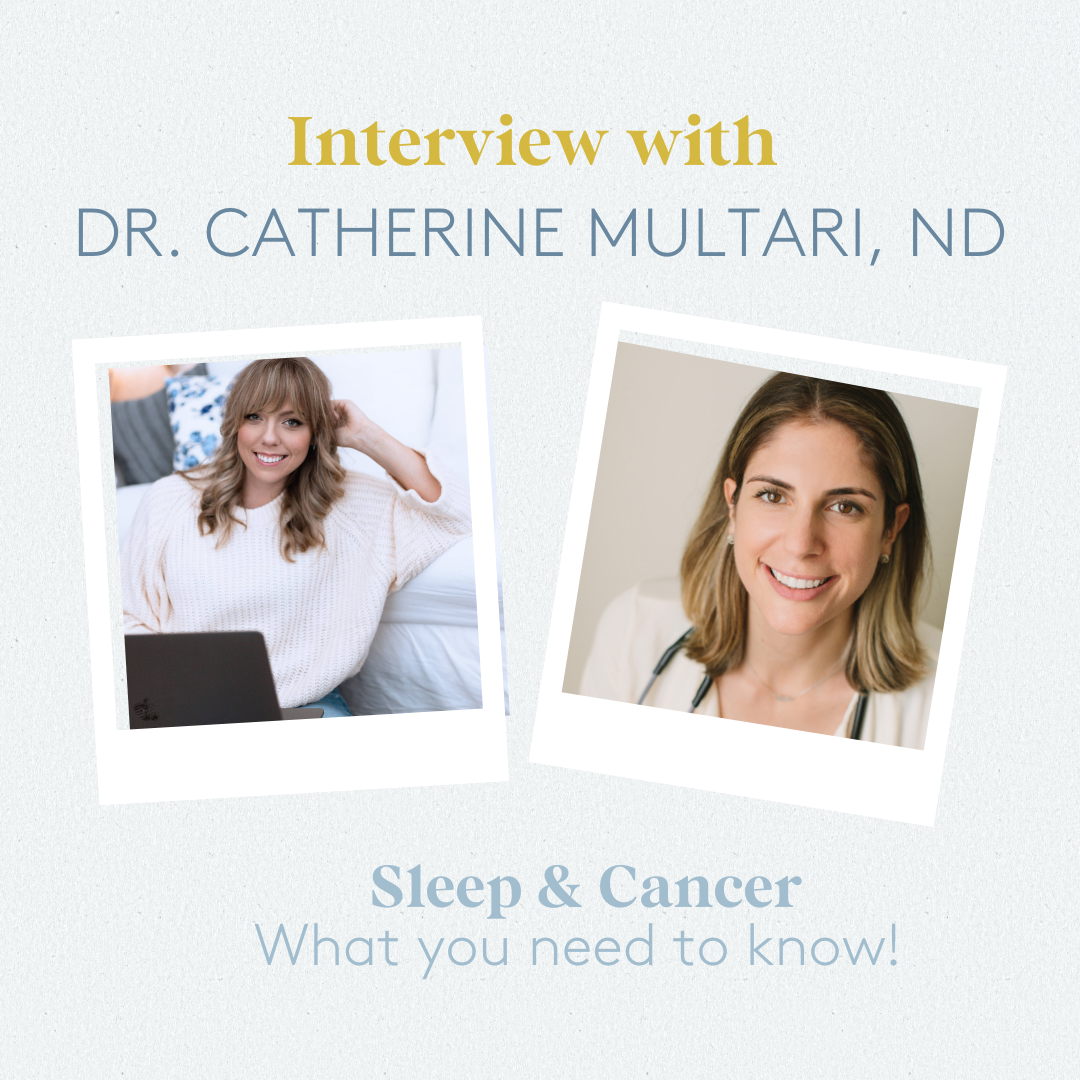Why Sleep Is Important in Cancer Prevention.
An Interview with guest writer Dr. Catherine Multari, ND (Naturopathic Doctor)
Dr. Catherine Multari is a good friend and colleague of mine and I had to bring her on to share her expertise! We first met in our business networking group and have been collaborating ever since! She is one of the smartest humans I know and does amazing work in the field of oncology and supporting cancer patients. Cancer is a scary word and I hope that this blog provides you with some peace of mind that there are people out there who can help prevent and treat. Read for our interview!
Good morning Dr. Catherine Multari! Thank you so much for guest blogging we are so excited that you are here. First, let’s start off with an introduction! Can you tell us a little about your background? What got you into naturopathic medicine?
I was an athletic and academic kid growing up, which facilitated my inquiry into the world of health optimization and performance. I would lean on the pillars of health (sleep, nutrition, exercise, mental wellness etc.) to optimize my performance as an athlete and was passionate about learning more and supporting others. When it came to medicine, a career I've always wanted to pursue, I was shocked at the lack of education and dedication to these preventative measures in medical school as well as primary practice.
Through my educational journey, I learned that many diseases are preventable. For example, Cardiovascular disease is the leading cause of death in Canada, and also one of the most preventable diseases. Its risk factors include smoking, lack of exercise, poor nutrition, obesity, high blood pressure and high cholesterol. I wanted to practice proactive upstream medicine as opposed to reactive symptom management. In addition, for patients coming to me with disease I wanted to empower them on a journey to health through addressing the pillars of health, using nutraceuticals (vitamins, minerals, herbs etc.) to correct for dysfunction and western advances in pharmaceuticals when needed. I grew up in a blue-collar town and was only exposed to western medicine. A friend of mine asked "have you considered naturopathic medicine?", which I soon realized checked all the boxes and the rest is history!
What is your speciality?
I have a clinical focus in integrative cancer care. I most commonly work with patients who are simultaneously undergoing surgery, chemotherapy, radiation, immunotherapy or targeted therapy. Both cancer itself, as well as the treatment options are accompanied by numerous, debilitating side effects leading to a reduced quality of life. The therapies I offer are safe, well-researched and effective at reducing side effects, improving quality of life and improving outcomes for individuals living with cancer. I have pursued additional training in this field completing a two-year accredited residency in naturopathic oncology and obtained the status of Fellow of the American Board of Naturopathic Oncology (FABNO), a designation held by only a small group of naturopathic physicians in Canada.
Thank you so much for your insight and wow you have SO Much experience. Congratulations! I only grew up around the western medicine model, and not until enough was enough with my acne, weight and moods did I turn to naturopathic medicine. As you mentioned, preventative medicine, in the research I have done I learned that sleep is a helpful preventative strategy in reducing risk of cancer. Can you tell us a little bit more why sleep may be helpful to prevent cancer and help with cancer recovery?
Adequate quantity, quality and timing of sleep is preventative for cancer. We know sleep has a strong regulatory effect on the immune system. When we sleep properly we give the immune system a chance to form immunologic memory and function properly. When we fall short on our sleep the opposite is true, and we become more prone to catching an infection. The immune system is our first line of defence against cancer. A chronically weakened immune response increases our risk of cancer.
Timing of sleep is also important. As a species we are designed to wake with sunrise and sleep with sunset, hence our physiologic processes that function accordingly (i.e. pineal gland secretes melatonin in absence of light). This natural sleep-wake cycle is otherwise known as our circadian rhythm and helps us optimize our bodily function and prevent disease. For such reasons, it is well outlined that shift workers have an increased risk of cancer as well as other chronic diseases such as cardiovascular disease.
Lastly, sleep is an equally important topic of conversation for those actively living with cancer. Poor preoperative sleep quality was seen to increase postoperative pain after breast cancer surgery. In one study, breast cancer patients with reduced sleep quality experienced an increased need for pain medication, experienced more complications, and had longer hospital stays.
If we had to give the readers some behaviour changes they could make today what are your top 3 preventative suggestions you have for clients to reduce their risk of cancer and/or recovery.
Many are surprised to hear that only 5-10% of cancers are attributed to genetic defects. I have seen many patients who do fall in that 5-10%, however, there is much that can be done to reduce an individual's cancer risk which will also improve their overall health!
My top 3 strategies for cancer prevention are:
1) Reduce alcohol intake, and eliminate smoking (tobacco, vape, cannabis etc.)
2) Maintain a healthy body weight (BMI <25, with the exception of a higher BMI due to significant muscle mass with a healthy waist circumference / absence of abdominal adiposity)
3) Maintain a healthy circadian rhythm (facilitated through adequate sleep and stress reduction) Check out YBG’s free sleep hygiene quiz and PDF for valuable tips!
xoxo, Nicole
This article does not constitute medical advice. Consult your naturopathic doctor or medical practitioner before taking any supplement or medication.
